Do you want to add new users and authors to your blog?
WordPress comes with a built-in user management system. This lets you add users with different roles and permission levels.
In this article, we will show you how to add new users and authors to your WordPress website.
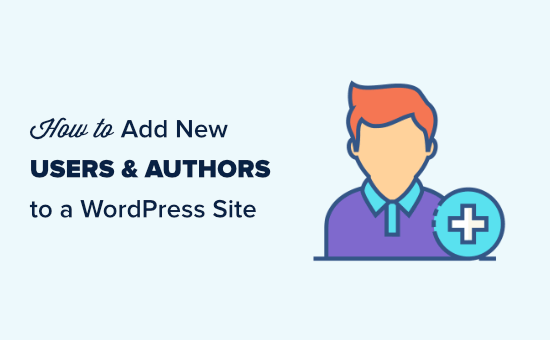
Adding a New User or Author to Your WordPress Website
There are three ways to add new users to your WordPress website. You can add users manually, let users register themselves for free, or create a paid membership site where users pay to register.
Here is what we are going to cover in this article. Simply click on the quick links to jump straight to the section you need:
Video Tutorial
If you prefer written instructions, then just keep reading.
Manually Adding a New User or Author to Your Website
If you want to add a small number of people to your website, then this is easy to do with WordPress’s built-in user management system.
This method is ideal for:
- Small businesses with several different employees managing their websites.
- Organizations, such as churches and nonprofits, with volunteers updating their websites.
- WordPress blogs with multiple authors, such as a fashion blog that you are writing with some friends.
- Online stores with several people managing inventory, shipping items, etc.
You simply need to go to the Users » Add New page in your WordPress admin area.
Next, simply fill out the form to create a new user.
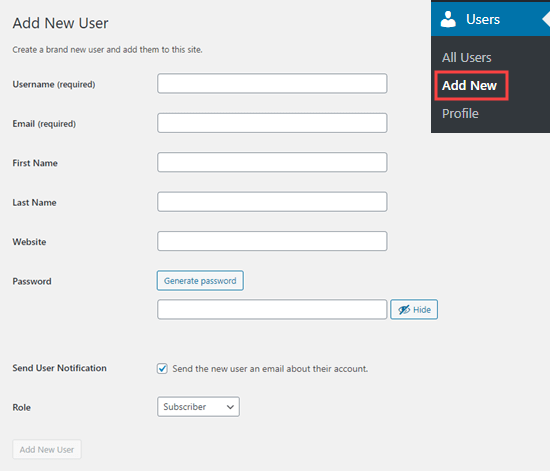
On the form, you first need to enter a username. The user can use this or their email address to log in.
Note: The WordPress username can’t be easily changed later, but all the other details can.
Next, enter the user’s email address. Double-check that you are using the correct email address. Users will need this in order to reset their password and receive email notifications.
After that, you can enter the first name, last name, and website URL. Since these are optional fields, you can also leave them blank. Users can edit their own profiles to complete these fields later.
In the next step, you will need to choose a password. We recommend using an online strong password generator for this purpose.
We suggest using the ‘Generate password’ button to automatically create a strong password.
Below the password field, you will see a checkbox to send the user an email. If you check this, the user will receive an email letting them know how to log in. This will also have a link so they can set a different password if they want.
The last option on the page is to choose a WordPress user role from the dropdown list.
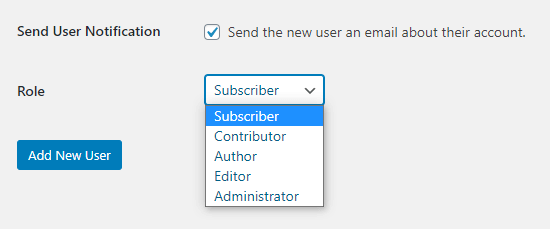
Each user role comes with a different set of capabilities. Subscriber is the least powerful role, and Administrator is the most powerful role. You need to choose a role depending on which tasks a user will be performing on your website.
You may already know what role you want to give your user. If so, select the role, then click the ‘Add New User’ button at the bottom of the screen.
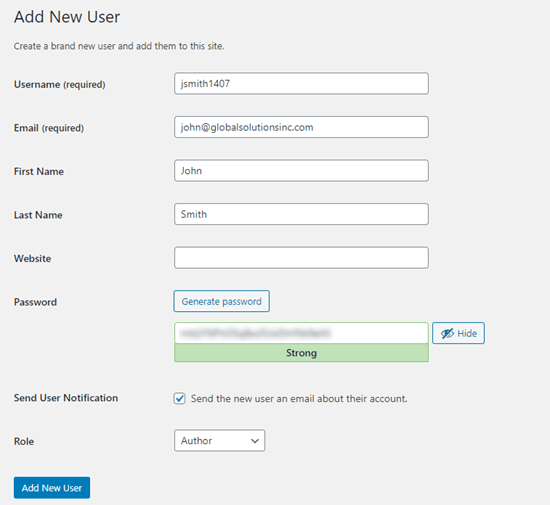
If you are unsure about the role, then don’t worry. We have a detailed explanation of the roles in the next section of this article.
Remember, some plugins create additional user roles.
For instance, WooCommerce adds ‘Customer’ and ‘Shop Manager’ roles. All in One SEO adds the ‘SEO Manager’ and ‘SEO Editor’ roles.
Simply check the plugin’s documentation to find out about any additional roles that you see in this list.
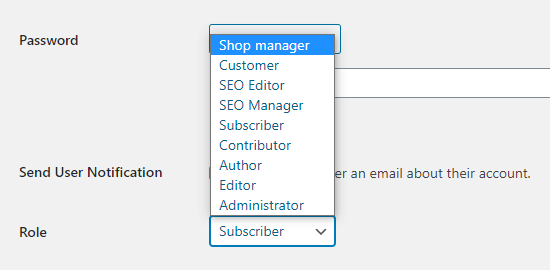
Understanding User Roles in WordPress
WordPress comes with these default user roles:
- Administrator
- Editor
- Author
- Contributor
- Subscriber
If you have a multisite installation of WordPress, there is also a ‘Super Admin’ role. These users can manage all of the websites, whereas regular Administrators manage just one site.
Administrator
An administrator can perform all tasks on your WordPress site.
You should only assign this role to users whom you fully trust. You should also feel confident about their technical skills.
With the administrator user role, a user can install WordPress plugins, change themes, delete content, and even delete other users. This includes other administrators.
You can learn more about the Administrator role here.
Editor
An editor can add, edit, publish, and delete their own WordPress posts. They can also do all of these actions for posts by all other users.
They cannot access website settings, plugins, themes, and other admin features.
This role is useful if you have an editor for your site who manages a team of authors and publishes content on a regular basis.
You can learn more about the Editor role here.
Author
Authors can add, edit, and publish their own posts. They can upload files, too.
They can’t edit or publish other people’s posts or access features like plugins, themes, settings, and tools.
You may want to use a plugin to restrict authors so they can only write in a specific category.
You could also let authors revise their published posts. Again, you will need to use a plugin to extend the Author user role.
You can learn more about the Author role here.
Contributor
A contributor can add and edit their own posts but cannot publish them.
Additionally, they cannot edit other users’ posts or access features like plugins, themes, settings, and tools.
It is important to note that contributors cannot upload media files, such as images. The easiest way to get around this is to get contributors to upload their post’s image(s) through a file upload form.
That way, the image(s) can be saved straight to the WordPress media library. This makes it easy for an editor or administrator to add them to the post.
You can learn more about the Contributor role here.
Subscriber
The subscriber role does not let users add or edit posts in any way.
With the default settings, subscribers can create a profile and save their details. This lets them enter them more quickly when leaving comments.
You can also use a membership plugin or LMS plugin to create members-only content that is available to subscribers. We will come onto that later in this article.
You can learn more about the Subscriber role here.
To find out more about all the different user roles in WordPress and how they relate to one another, you can check out our beginner’s guide to WordPress user roles and permissions.
Managing Users in WordPress
As an administrator, you can add and remove users from your WordPress site at any time. After you have added a user, you can edit their profile and change any information, including passwords.
Simply click on the Users tab in your WordPress admin to go to the user page. You can edit or delete a user at any time.
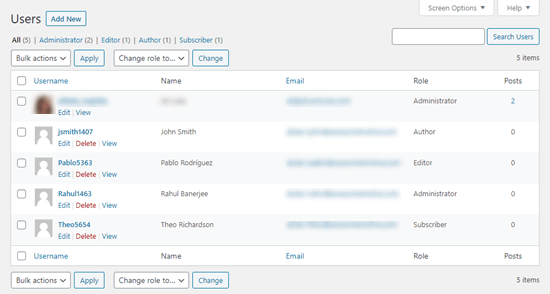
You can edit the user’s profile to change their password, their role, and more. You can also bulk edit users to change their roles if you want to upgrade or downgrade several users’ roles at the same time.
Users can also edit their own profile by going to Users » Profile in the WordPress dashboard. They can add a profile picture and change most of their details, but they cannot change their role.
Open Your WordPress Site for Anyone to Register for Free
What if you want to let users register on your site for free?
It would be a lot of work to add each user manually. Instead, you can let them create their own account.
First, you need to go to Settings » General in your WordPress admin and check the ‘Anyone can register’ box.

By default, new users will be given the Subscriber role. Go ahead and change this to any role you want using the dropdown.
Warning: We recommend only letting users register as ‘Subscribers’ or ‘Contributors.’ If you let users register as ‘Authors,’ they could publish a post without approval. Never use ‘Administrator’ as the default setting.
Don’t forget to click the ‘Save Changes’ button at the bottom of the page to store your changes.
You also need to add a login form to your site. The best way to do this is with the WPForms plugin. Just follow our guide on how to allow user registration on your WordPress site for help with this.
Tip: You can also disable the WordPress admin bar for subscribers or other user roles.
Creating a Paid Membership Program on Your Website
Another way to add new users to your site is to create a paid membership program that users sign up for.
This allows you to sell members-only content, add premium content behind a paywall, sell online courses, and more.
To do this, you need a WordPress membership plugin.
We recommend using MemberPress. It’s the best membership and course creation plugin with all the functionality and flexibility you need.
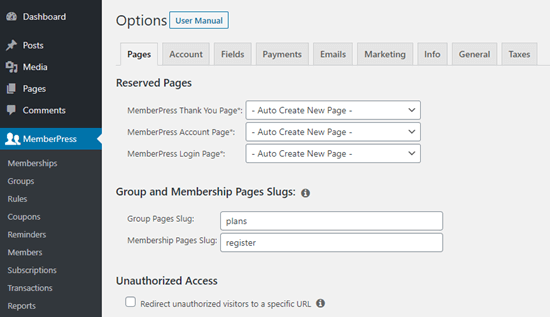
MemberPress lets you lock specific posts and pages on your site so that only registered, paying users can access them. Many sites offer premium content like this as a way to make money online.
With MemberPress, it’s easy to create different access levels.
For instance, you might offer a Bronze, Silver, and Gold plan. Each of these plans would have its own user role. You could create separate courses that only users with certain roles could sign up for.
You also get access to powerful tools such as MemberPress’s reports to see your average member lifetime value, how many members you have in total, and more.
MemberPress allows you to add drip content to create an evergreen membership site, and you can even sell group memberships in WordPress.
For a step-by-step tutorial on setting up MemberPress on your site, check out our ultimate guide to creating a WordPress membership site.
We hope this article helped you learn how to add new users and authors to your WordPress website. You may also want to see our comparison of the best email marketing services and our guide on how to add push notifications so that you can connect with your users after they leave your website.
If you liked this article, then please subscribe to our YouTube Channel for WordPress video tutorials. You can also find us on Twitter and Facebook.





Syed Balkhi says
Hey WPBeginner readers,
Did you know you can win exciting prizes by commenting on WPBeginner?
Every month, our top blog commenters will win HUGE rewards, including premium WordPress plugin licenses and cash prizes.
You can get more details about the contest from here.
Start sharing your thoughts below to stand a chance to win!
Princess Easterling says
I like the valuable information you provide for your articles.
I will bookmark your blog and test once more right here regularly.
I am quite certain I will learn lots of new stuff right here!
Best of luck for the following!
WPBeginner Support says
Thank you, glad our content can be helpful
Admin
Steven says
Where do the users I add go to log in once I’ve added them?
WPBeginner Support says
You can see the users under Users>All Users in your wp-admin area
Admin
Merrill Whipple says
It’s actually a nice and useful piece of info. I am happy that
you shared this helpful information with us. Please keep us informed like this.
Thank you for sharing.
WPBeginner Support says
Glad you liked it and found it helpful
Admin
Sasha says
Is there a way to send a bulk email to all the Users with Author or Admin access containing their login details?
WPBeginner Support says
Not one we would recommend at the moment
Admin
Caitlin Zimmermann says
For newest information you have to visit world wide web and on world-wide-web I found this
site as a finest web site for hottest updates.
WPBeginner Support says
Thanks, glad you’ve found our content helpful
Admin
Lynn Loveless says
Somе genuinely superb articles οn this website, thank үoᥙ foг contribution.
WPBeginner Support says
Glad you like our articles
Admin
Lou Steigrad says
That is a great tip especially to those fresh
to the blogosphere. Short but very accurate information… Thank you for sharing this one.
A must read post!
WPBeginner Support says
Glad you found our post helpful
Admin
Jason Baskerville says
Having read this I believed it was really enlightening.
I appreciate you spending some time and effort to put this short article together.
I once again find myself personally spending a lot of time both reading and leaving comments.
But so what, it was still worthwhile!
WPBeginner Support says
Glad you find our articles educational and useful
Admin
Meagan Bales says
Very soon this website will be famous amid all blogging viewers, due to it’s pleasant articles
WPBeginner Support says
Glad you find our articles helpful
Admin
Mostafa says
after I added a new user
automatically WordPress send email to this user to tell his
but I want WordPress doesn’t it
How can I do that?
Jeffry Rentoul says
Whats սp this is kind of of off topic but I waѕ wondering if blogs use WYSIWYG editors oг if you hɑѵe to manually
code with HTML. I’m starting а blog soon but have no coding experience so I wаnted to get
guidance fгom someone ԝith experience. Αny help ѡould Ьe enormously appreciated!
WPBeginner Support says
Hi Jeffry,
Yes they have WYSIWYG editor to write your content. You don’t need to add HTML unless you want to.
Admin
Tesla says
but how can i edit a user dashboard without affecting the whole page and other users dashboard
Miroslav says
Respect. How to add a user who will be able to see what I (as administrator) is a complete control panel but without the ability to add, change or delete – but just review what I did. This is what I need to keep a look at the layout of the site and point to the possibility of solving the problem I have. Thank you!
WPBeginner Support says
Hi Miroslav,
Users will only be able to see the areas where they can make changes. For example, if you want them to be able to see theme settings, then they will also be able to modify them.
Admin
Okpala Precious says
Hi, I just employed someone to my blog and added him as a user. I don’t want him to have access or to be logging in to my site dashboard with the main details. How can I make him have his own log in details or which link would lead him to the dashboard as an Author?
samsta says
hello. i have been added to be a user administrator to another wordpress account, however i’m not able to see that website under my profile. i have to go on to the website and login everytime i need to contribute something. is there anyway i am able to see said website under my profile or on my dashboard to access it easily?
richie treadway says
How do I add an authors name so I can credit them for guest posts, without actually giving them access to my site?
WPBeginner Support says
Hi Richie,
Please see our guide on how to add guest author name with custom fields in WordPress.
Admin
Nicola Hasted says
Hi, is it possible to add an existing WP user to a site using their gravatar or WP login? I have been added to a clients site in this way but I don’t know how they achieved it (I received no email or new password etc).
WPBeginner Support says
Hi Nicola,
Yes, they can do that. Unfortunately, there is no way to stop this from happening. If they added you without your permission, then you can ask them nicely to stop. If they have used your Gravatar profile to publish content, then you have the option to take legal action. You can send them a cease and desist notice.
Admin
Nicola Hasted says
Thanks – it’s not a problem. In fact, I want to know how to do it for my own WP sites! And for future reference with other clients. When I go to “Add User” it wants a password set up. But I was able to access their site with my own WP login info. How is it done, please?
WPBeginner Support says
Hi Nicola,
They can add your login email but they cannot add your password. You can go to Add New User page and select the checbox next to ‘Send User Notification’ option. Make sure that you don’t click on show password button. This way users will receive an email notification to set their password and login.
Cameron Tomasini says
Hello there! Quick question that’s entirely
off topic. Do you know how to make your site mobile friendly?
My weblog looks weird when viewing from my iphone. I’m trying to find a theme or plugin that might be able to correct this problem.
If you have any recommendations, please share. With thanks!
WPBeginner Support says
Hi Cameron,
Best way to do this is by choosing a mobile friendly WordPress theme. Check out the showcase section on our website for our theme lists. All themes in those lists are mobile responsive.
Admin
Pradeep Singh says
Hello This article really helpful for me. I was searching such type of content, now I am able to add new editor, contributor or author in my wordpress website
Thanks
WPBeginner Support says
Hi Pradeep,
We are glad you found the article helpful. You may also want to subscribe to our YouTube Channel for WordPress video tutorials.
Admin
Gerald Fisher says
I am part of a blog that has been out of service for a while. The blog owner wants to start back up again. He has invited me as an adminstrator and wants me to invite new member. The only page I can get when I click on “add new” is “add existing user”. I cannot load the ‘add new user’ page that you show towards the top of this article. Can anyone tell me what we (or maybe just I) are doing wrong? Thanks
Alisa Woolery says
This page certainly has all the information and facts I needed
about this subject and didn’t know who to ask.
Harrison Hemming says
Do you mind if I quote a couple of your articles as long as I provide credit and sources back to your webpage?
My website is in the very same niche as yours and my visitors would genuinely benefit from a lot of the information you present here.
Please let me know if this okay with you. Appreciate it!
David Reay says
I relish, result in I found just what I was taking a look for.
You have ended my four day lengthy hunt! God Bless you man. Have a nice day.
Bye
Raphael Nava says
I loved as much as you’ll receive carried out right here. The sketch is tasteful,
your authored material stylish. nonetheless, you command get bought an shakiness over that you wish be delivering the following.
unwell unquestionably come more formerly again as exactly the
same nearly a lot often inside case you shield this hike.
Carroll Barff says
Whats up very cool website!! Man .. Excellent .. Superb ..
I will bookmark your site and take the feeds additionally?
I’m glad to find so many helpful info right here within the submit, we’d like work outt
extra techniques on this regard, thanks for sharing.
. . . . .
Gregg Greenwell says
This paragraph presents clear idea in support of the
new people of blogging, that truly how to do blogging.
Tim Conklin says
Hey I know this is off topic but I was wondering if you knew of any widgets I could add to
my blog that automatically tweet my newest twitter updates.
I’ve been looking for a plug-in like this for
quite some time and was hoping maybe you would have some experience
with something like this. Please let me know if you
run into anything. I truly enjoy reading your blog and I look forward
to your new updates.
WPBeginner Support says
Hey Tim,
Please take a look at our guide on how to schedule WordPress posts for social media with Buffer. It allows you to automatically share new posts from your blog to Twitter, Facebook, and LinkedIn.
Admin
Carey Mutch says
Pretty! This has been a really wonderful article.
Thanks for providing this info.
Zak Fauchery says
There is certainly a lot to find out about
this issue. I really like all the points you have made.
Ophelia Hotchin says
Hmm is nyone else experiencing problems with the images
on this blog loading? I’m trying to find out if its a problem on my end or if it’s
thhe blog. Any feedback would be greatly appreciated.
Maddison Gann says
Howdy! Quick question that’s entirely off topic. Do you know how to make your site mobile friendly?
My site looks weird when viewing from my apple iphone.
I’m trying to find a template or plugin that might be able to fix this problem.
If you have any suggestions, please share. Thanks!
Rosita Devito says
Only wanna say that this is very beneficial, Thanks for taking your time
to write this.
Bernard Hennings says
Nice weblog here! Additionally your site quite
a bit up very fast! What host are you using? Can I get your associate hyperlink in your host?
I want my site loaded up as fast as yours lol
WPBeginner Support says
Hi Bernard,
Our website is hosted on a dedicated server with HostGator.
Admin
Stephen Allison says
Nice blog here! Additionally your website a lot
up very fast! What web host are you the use of? Can I am getting your
associate hyperlink on your host? I want my site loaded up as fast as yours lol.
Bryan Corbo says
If you would like to get much from this article then you have to apply
such techniques to your won weblog.
Fausto Hair says
Hi this is kinda of off topic but I was wanting to know
if blogs use WYSIWYG editors or if you have to manually code
with HTML. I’m starting a blog soon butt have no coding expertise sso I wanted to
get guidance from someone with experience. Any help would bee greatly appreciated!
WPBeginner Support says
Hi Fausto,
WordPress comes with an easy to use WYSIWYG editor called Visual Editor. It also comes with a text editor for more advanced users who want to write plain HTML.
Admin
Christian Cremean says
Thanks for finally writing about >How to Add
New Uses and Authors to Your WordPress Bloog <Liked it!
Onyango says
After adding a user, what password does he use?
Modesta Corbin says
Hello! I know this is somewhat off topic but I was wondering which blog platform are you using for this website?
I’m getting sick and tired of WordPress because I’ve had issues with hackers and I’m looking at options for another
platform. I would be great if you could point me in the direction of a good platform.
WPBeginner Support says
Hi Modesta,
We are using WordPress for this website. We use WordPress for all our websites. As for security, you may want to see our WordPress security guide to protect your website against hackers.
Admin
Rusty Rubeo says
That is a great tip particularly to those new to the blogosphere.
Short but very precise information… Thank you for
sharing this one. A must read post!
Ulrich Dortch says
Hi there! Do you know if they make any plugins to help with SEO?
I’m trying to get my blog to rank for some targeted keywords but I’m not seeing very good success.
If you know of any please share. Cheers!
WPBeginner Support says
Hi Ulrich,
Please check out our WordPress SEO guide for beginners.
Admin
Sienna Hopwood says
I know this if off topic but I’m looking into starting
my own blog and was curious what all is required to get
set up? I’m assuming having a blog like yours would cost a pretty penny?
I’m not very internet smart so I’m not 100% sure. Any tips or
advice would be greatly appreciated. Thanks
WPBeginner Support says
Hey Sienna,
Please see our guide on how to start a WordPress blog. The cost actually depends on how fast your site grows and how much you want to invest on it.
Admin
Louann Saucier says
I think that what you published was actually very reasonable.
But, think about this, what if you composed a catchier post
title? I am not suggesting your content isn’t good, however what if you added
a headline that grabbed people’s attention? I mean How to Add
New Users and Authors to Your WordPress Blog is kinda boring.
You could peek at Yahoo’s home page and watch how they create post headlines to get
viewers to click. You might add a related video or a pic or two
to get people interested about what you’ve got to say.
Just my opinion, it could bring your posts a little livelier.
Kate says
I feel like this is a stupid question but…I have added a user. How do they log in to post? The username and password I set up for them isn’t working to log into wordpress.
WPBeginner Support says
Hi Kate,
They will need to visit the login page on your website. They just need to add /wp-admin/ after your domain name. like http://example.com/wp-admin/
Your user can also click on the ‘Lost Your Password?’ link to reset the password.
Admin
James says
This may be a stupid question – I’m setting up a multi-author site, I have clicked ‘anyone can register’ and have set up registration with both profile builder and with wp-members. People who register are automatically assigned ‘contributor’ status. However when I am logged in as a fake user, the admin panel doesn’t appear – in short, my question is – how do contributors contribute?!
Trevor says
What settings do You use when You have a company maintaining Your sites, but You don’t want them to CONTROL the site completely
Mo Bock says
Good video except for one thing: being a neophite, I’m not sure how to get to the ‘general settings’ bar in order to do all those things. I want to add users. Thanks!
WPBeginner Support says
Please see our beginner’s guide on how to find your WordPress login URL
Admin
yos garber says
I wish there was a role to assign specifically for a freelance web developer doing site maintenance without giving total admin rights
EMMANUEL says
This is so useful, The blogs I manage are increasing in number, and giving others one of these roles is awesome. Thanx.
Loren Mayshark says
Thank you for sharing the video. I found it very helpful!